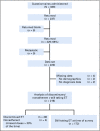Simulating Time-Dependent Patterns of Nonadherence by Patients With Breast Cancer to Adjuvant Oral Endocrine Therapy
- PMID: 31002563
- PMCID: PMC6873985
- DOI: 10.1200/CCI.18.00091
Simulating Time-Dependent Patterns of Nonadherence by Patients With Breast Cancer to Adjuvant Oral Endocrine Therapy
Abstract
Purpose: Nearly 40% of patients with breast cancer discontinue their adjuvant oral endocrine treatment (ET). We measured discontinuation rates of ET at a comprehensive cancer center. We then used an iterative approach to model patterns of determinants associated with discontinuation of ET.
Methods: Patients with nonmetastatic breast cancer receiving active adjuvant ET were approached by nurse practitioners to complete an anonymous survey at one time point. We simulated a prospective model by iteratively regressing adverse effects onto adherence status across windowed time periods of 2 to 3 consecutive years, bootstrapping the smaller group of nonadherent patients and subsampling the larger adherent group.
Results: From February to April 2013, 216 participants were enrolled in the study. Forty patients (18.5%) reported that they had discontinued ET during the first 5 years of ET, and an additional four patients (1.9%) missed > 20% of their doses. Using two-sided significance tests, simulations showed that all 13 ET adverse effects and reasons for discontinuation were significantly related to discontinuation at some time point during ET. Worry about ET cost (odds ratio [OR], 1.79), emotional distress (OR, 1.72), and bone and joint pain (OR, 1.69) were the three most impactful reasons for discontinuation, with varying patterns of influence over time.
Conclusion: These analyses provide preliminary evidence that there are varying patterns of discontinuation of ET. Although some reasons for discontinuation exerted a steady influence over the 6-year ET trajectory (ie, bone and joint pain), other reasons, such as cost, cognitive complaints, and general dislike of pills, became more important in the later years of ET.
Conflict of interest statement
Eileen H. Shinn
Stacy Moulder
William Fraser Symmans
No other potential conflicts of interest were reported.
Figures




Similar articles
-
Patterns of endocrine therapy in a national cohort of early stage HER2-positive breast cancer patients.Pharmacoepidemiol Drug Saf. 2019 Jun;28(6):812-820. doi: 10.1002/pds.4751. Epub 2019 Mar 12. Pharmacoepidemiol Drug Saf. 2019. PMID: 30861596
-
Persistence and discontinuation of adjuvant endocrine therapy in women with breast cancer.Breast Cancer. 2016 Jan;23(1):128-133. doi: 10.1007/s12282-014-0540-4. Epub 2014 Jun 17. Breast Cancer. 2016. PMID: 24934610
-
Analysis of Adjuvant Endocrine Therapy in Practice From Electronic Health Record Data of Patients With Breast Cancer.JCO Clin Cancer Inform. 2017 Nov;1:1-8. doi: 10.1200/CCI.16.00044. JCO Clin Cancer Inform. 2017. PMID: 30657375 Free PMC article.
-
Endocrine adherence in male versus female breast cancer: a seer-medicare review.Breast Cancer Res Treat. 2022 Apr;192(3):491-499. doi: 10.1007/s10549-022-06536-0. Epub 2022 Feb 10. Breast Cancer Res Treat. 2022. PMID: 35142938 Review.
-
[Adjuvant endocrine therapy in premenopausal breast cancer: a initial dedicated counseling: can it be useful for better adherence?].Bull Cancer. 2019 Dec;106(12S1):S28-S36. doi: 10.1016/S0007-4551(20)30045-X. Bull Cancer. 2019. PMID: 32008735 Review. French.
Cited by
-
Potentially Modifiable Factors Associated with Adherence to Adjuvant Endocrine Therapy among Breast Cancer Survivors: A Systematic Review.Cancers (Basel). 2020 Dec 31;13(1):107. doi: 10.3390/cancers13010107. Cancers (Basel). 2020. PMID: 33561076 Free PMC article. Review.
-
Resistance to Resilience: Understanding Post-surgical Hormone Therapy in Breast Cancer Care.Cureus. 2023 Oct 28;15(10):e47869. doi: 10.7759/cureus.47869. eCollection 2023 Oct. Cureus. 2023. PMID: 38021507 Free PMC article. Review.
-
Transepithelial Anti-Neuroblastoma Response to Kale among Four Vegetable Juices Using In Vitro Model Co-Culture System.Nutrients. 2021 Feb 2;13(2):488. doi: 10.3390/nu13020488. Nutrients. 2021. PMID: 33540724 Free PMC article.
-
Evaluation of adherence to pharmacological treatments by undocumented migrants with chronic diseases: a 10-year retrospective cohort study.BMJ Open. 2024 May 9;14(5):e078431. doi: 10.1136/bmjopen-2023-078431. BMJ Open. 2024. PMID: 38724060 Free PMC article.
-
Further Evidence That OPG rs2073618 Is Associated With Increased Risk of Musculoskeletal Symptoms in Patients Receiving Aromatase Inhibitors for Early Breast Cancer.Front Genet. 2021 Jun 15;12:662734. doi: 10.3389/fgene.2021.662734. eCollection 2021. Front Genet. 2021. PMID: 34211496 Free PMC article.
References
-
- Moore S. Nonadherence in patients with breast cancer receiving oral therapies. Clin J Oncol Nurs. 2010;14:41–47. - PubMed
-
- Hadji P. Improving compliance and persistence to adjuvant tamoxifen and aromatase inhibitor therapy. Crit Rev Oncol Hematol. 2010;73:156–166. - PubMed
-
- Ma AM, Barone J, Wallis AE, et al. Noncompliance with adjuvant radiation, chemotherapy, or hormonal therapy in breast cancer patients. Am J Surg. 2008;196:500–504. - PubMed
-
- Yood MU, Owusu C, Buist DS, et al. Mortality impact of less-than-standard therapy in older breast cancer patients. J Am Coll Surg. 2008;206:66–75. - PubMed
Publication types
MeSH terms
Substances
Grants and funding
LinkOut - more resources
Full Text Sources
Medical
Miscellaneous

